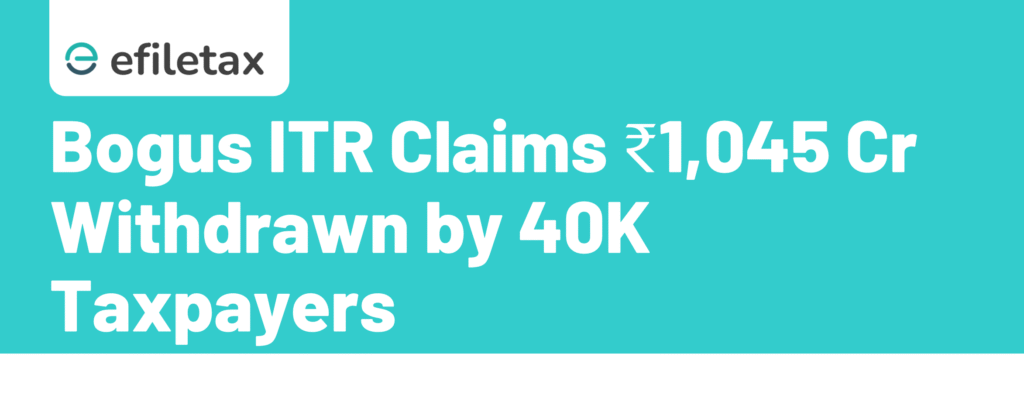
Intro:
Bogus ITR deductions are now a high-priority target for the Income Tax Department. In a recent crackdown, over 40,000 taxpayers withdrew fake claims worth ₹1,045 crore. With stricter data checks and AI-based scrutiny in FY 2024–25, filing inflated exemptions can lead to penalties, notices—or worse.
Why Bogus ITR Deductions Are Under Scrutiny
Over the past few years, inflated claims under Section 80C, 80D, HRA, home loan interest, and capital gains exemptions have been a soft target for many taxpayers. But with upgraded IT infrastructure and cross-verification from multiple data sources (banks, employers, mutual funds, TDS), the Income Tax Department is catching up fast.
In FY 2023–24:
- 40,000 taxpayers voluntarily withdrew wrongful deduction/exemption claims
- Total amount reversed: ₹1,045 crore
- Reason: Fear of audit, penal action, and income tax notices
(Source: Income Tax Department press statement, July 2025)
Common Fake Deduction Claims Flagged
Here are the most misused or inflated claims:
| Section | Claim Type | Common Misuse |
|---|---|---|
| 80C | LIC, PPF, ELSS | Claiming without proof or duplicate entries |
| 80D | Medical Insurance | Fake premium receipts or non-family members shown |
| 10(13A) | HRA | Fictitious landlord or inflated rent receipts |
| 24(b) | Home Loan Interest | False loan documents or unverified lenders |
| 10(38)/10(37) | Capital Gains | Claiming exemption without valid asset sale or incorrect timeline |
Income Tax Department’s New Approach
The department has integrated multiple data points and automated scrutiny, including:
- AI-based mismatch detection from AIS, TIS, and Form 26AS
- Cross-checking with PAN-linked GST data, property records, and EPFO/UAN databases
- Pre-verification before refund release, especially for large claims
- E-campaigns and e-verification notices to nudge voluntary corrections
Example: A salaried employee claiming ₹2 lakh under 80C without investment evidence may now get flagged before refund credit.
Legal Implications of Bogus Claims
If found guilty of wilfully furnishing false deductions:
- Penalty under Section 270A – 50% to 200% of the tax under-reported
- Prosecution under Section 277 – Up to 7 years imprisonment in serious cases
- Refund recall with interest – Under Section 143(1)/(2) assessments
- Case flagged for reassessment (Sec 147) within 3–10 years based on the amount
Expert Tip: Don’t Wait for a Notice—Self-Correct
According to tax experts, if you’ve made an incorrect claim:
- File a revised return under Section 139(5) if the deadline is open
- Else, respond under e-verification portal admitting error and paying due tax
- Keep proofs for all exemptions—insurance, loan statements, rent agreements, etc.
Efiletax helps clients with pre-filing review to ensure their ITR won’t get flagged later.
What Taxpayers Should Do in FY 2024–25
Here’s how to stay safe and compliant:
- Use AIS and TIS before filing
- Match income with Form 26AS and salary slips
- Avoid last-minute errors—review rent proofs, 80C investments, and loan certificates
- Disclose interest income from FD, savings—banks report this now
- Don’t blindly copy last year’s ITR—new rules may apply
Subheading with Keyphrase: Avoid Bogus ITR Deductions This Year
With real-time data integration and refund scrutiny becoming sharper, bogus ITR deductions aren’t worth the risk. Stay transparent and file with genuine records.
Summary
Over 40,000 taxpayers withdrew ₹1,045 crore in bogus ITR deductions after Income Tax Department scrutiny. Claims under Section 80C, HRA, and home loan interest are now under AI-based review. File clean returns to avoid penalties, refund delays, or prosecution in FY 2024–25.
FAQs
Q1. What is considered a bogus deduction in ITR?
A deduction claimed without genuine proof—like fake rent receipts, false insurance payments, or inflated home loan interest—is considered bogus.
Q2. Can I revise my return if I claimed a wrong exemption?
Yes, if the original return was filed on time, you can revise it under Section 139(5) within the due date.
Q3. Will I get a refund if I claimed a wrong deduction?
Not necessarily. Refunds are now pre-checked. If a bogus claim is found, refund can be withheld or reversed.
Q4. How does the ITD verify deductions now?
They use AIS, TIS, 26AS, and external data like PAN-Aadhaar, GST, EPFO, and banking records to match claims.